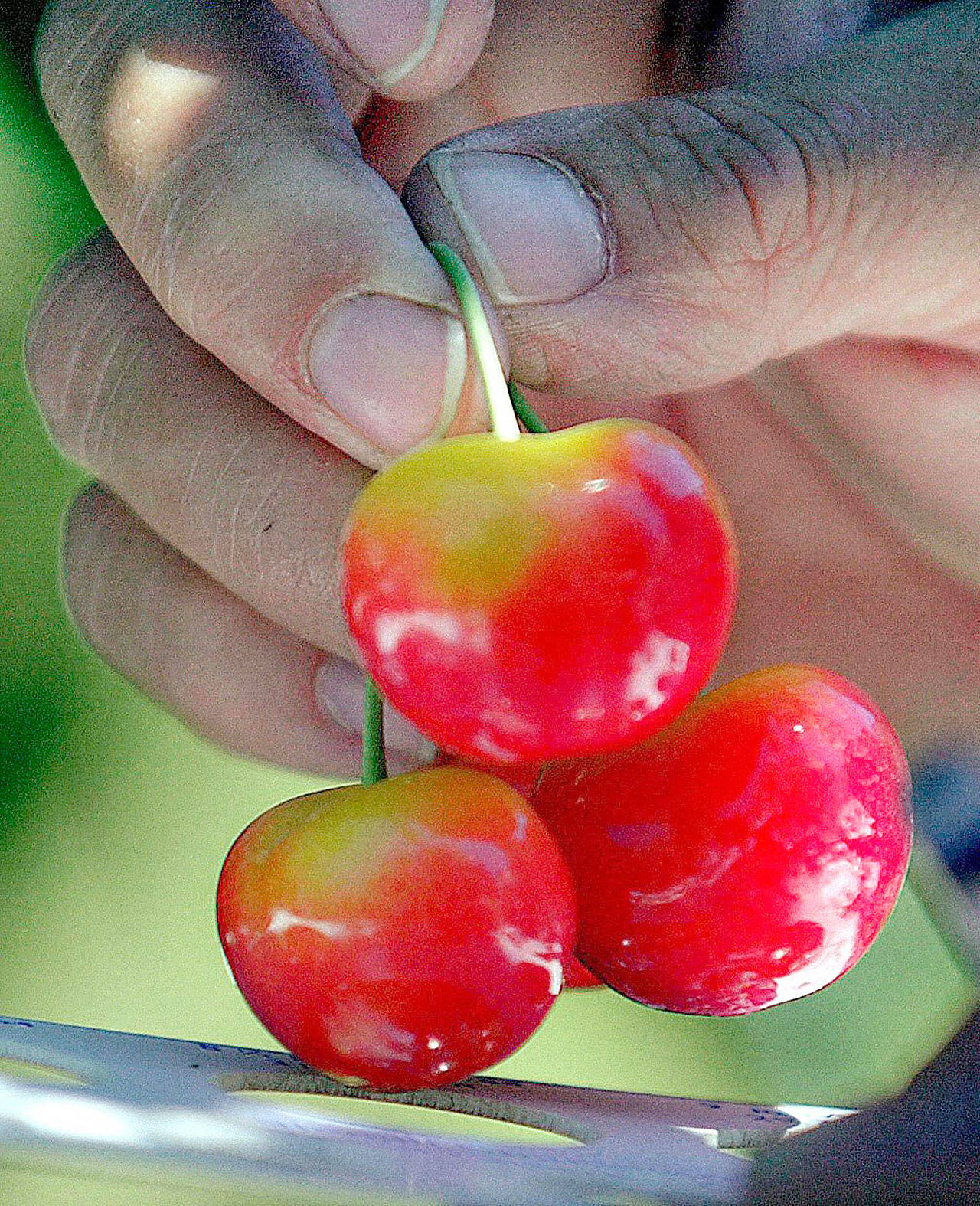By Jim Camden
The Spokesman-Review
Chinese tariffs announced Monday in response to U.S. tariffs on steel could undo some of the work over the last decade to market the region’s cherries and hurt the sales of apples and pears, agriculture experts said Monday.
Currently the Pacific Northwest’s biggest customer for sweet cherries, China bought some 58 million pounds, worth $127 million in 2017, said Kate Woods of the Northwest Horticultural Council. It was the first year China surpassed Canada as the top export market for the region’s cherries.
The Chinese demand for those cherries grew dramatically over the last 11 years, when the region first cracked the market, to 2017, when they bought 13 percent of the crop, said Keith Hu, director of international operations for the Northwest Cherry Growers Association.
“We worked hard,” said Hu, who was hired in 2006 to open the Chinese and Korean export market for cherries. “It took us a long time to convince retailers in China to try fresh cherries” and give them adequate shelf space.
The Chinese market for cherries is primarily consumers who are middle income and above, willing to pay a bit more for the Northwest’s higher-quality product, Hu said.
Northwest cherries already were charged a 10 percent import duty and a 13 percent value-added tax before the Chinese announced new tariffs. The 15 percent tariff raises the taxes to 38 percent. In recent years, cherries have sold in China for between $7 and $10 a pound, so a 15 percent tariff would add between $1 and $1.50.
China doesn’t grow many cherries domestically yet, Hu said. Turkey, the world’s top cherry producer, is the main competitor, but Turkish quality isn’t as good, so Chinese consumers have been willing to spend more for Northwest cherries.
“We hope if we can ship top-quality cherries, we can minimize the damage,” he said. “If we cannot deliver a satisfactory product … Turkey is knocking on the door.”
A significant market for a wide range of Washington agricultural products from hay to frozen french fries, China also imported some $17.6 million worth of apples and $697,000 worth of pears.
“It’s really too early to tell exactly what the impact will be,” Woods said. Because cherries are primarily sold fresh, and have a short shelf life, they aren’t being sold right now. Sales of apples and pears are ramping down.
Cherry trees are just starting to blossom in parts of Washington, so the size of the crop isn’t known yet. Harvesting starts in June.
It’s unclear what will happen with the announced 15 percent duty on fruit, Woods said, but the general rule is that prices go up for customers or down for producers. Or both.
California orchards will start harvesting cherries in late April, so Northwest growers might get an idea of the tariff’s impacts, although California doesn’t sell much of its crop to China, Hu said
“We’re hopeful the United States and China will reach a solution soon,” Woods said. “Agriculture seems to top the list when you talk about retaliatory tariffs.”
Fresh fruit imports may be among the first to face tariffs because they are not considered an essential food import like soybeans and sorghum, two commodities not on the tariff list, Hu said.
Initial reaction from the state’s elected officials tended to be general in nature, noting the state’s heavy reliance on all types of foreign trade, which would suffer casualties in a trade war.
“Washington is the most trade-dependent state in the nation and I have serious concerns about the impact the president’s tariffs on Chinese imports will have on our businesses and consumers,” Gov. Jay Inslee said. “A comprehensive approach is necessary to address complex international trade issues and we should continue to work through the World Trade Organization and alongside our partners in the global community.”
The office for Rep. Dan Newhouse, a Republican whose 4th Congressional District contains many of the state’s orchards, released earlier comments warning about the prospect of jobs being lost in central Washington as an unintended consequence of tariffs.
“Tariffs are essentially taxes on trade that are passed on to American businesses and consumers,” Newhouse said in an email. “I want to work with the administration to ensure that our flourishing export economy in Washington and the jobs that depend on trade are not disrupted by retaliatory tariffs on goods we produce at home and sell abroad.”
Rep. Cathy McMorris Rodgers said the announced tariffs threaten jobs and economic growth in the region. “It is unacceptable because our farmers and fruit producers are not participating in unfair trade practices, and I’ve reached out to the Trump administration to find out their plans to stop China from targeting our farmers in Eastern Washington.”
After meeting in Yakima with growers and leaders from the state’s agricultural industry, Sen. Maria Cantwell, D-Washington, said it was time to “de-escalate” the looming trade war.
“Agriculture should not pay the price for a steel tariff trade war,” said Cantwell, urging the United States and China to negotiate before the Washington and U.S. economies are hurt.


